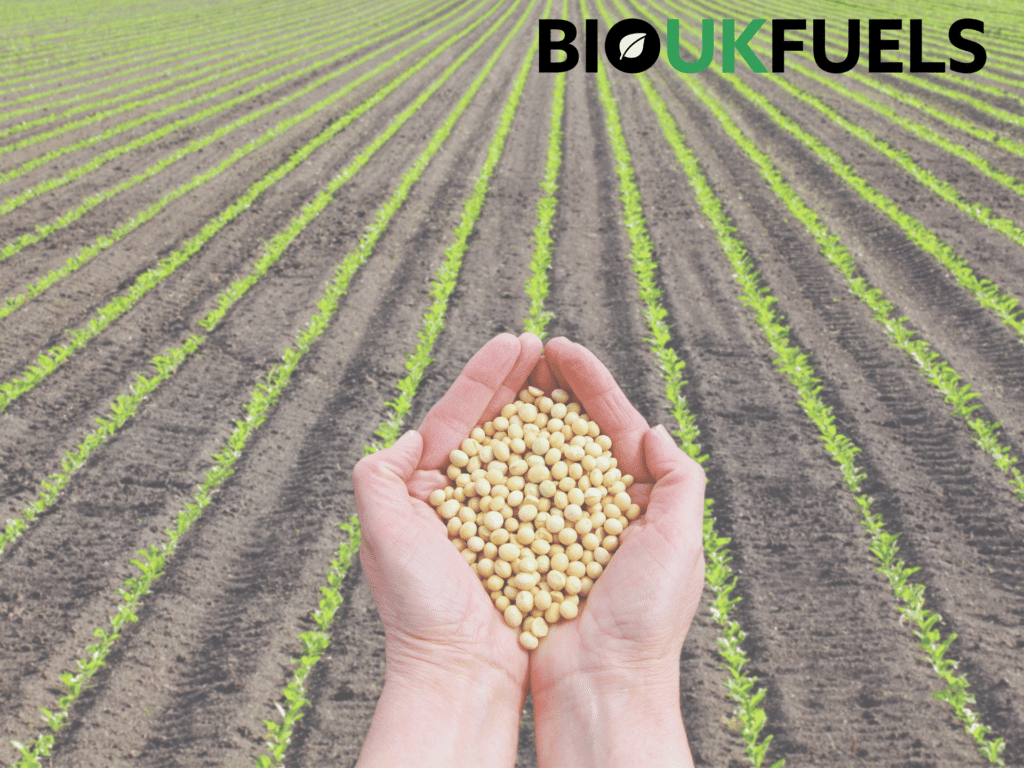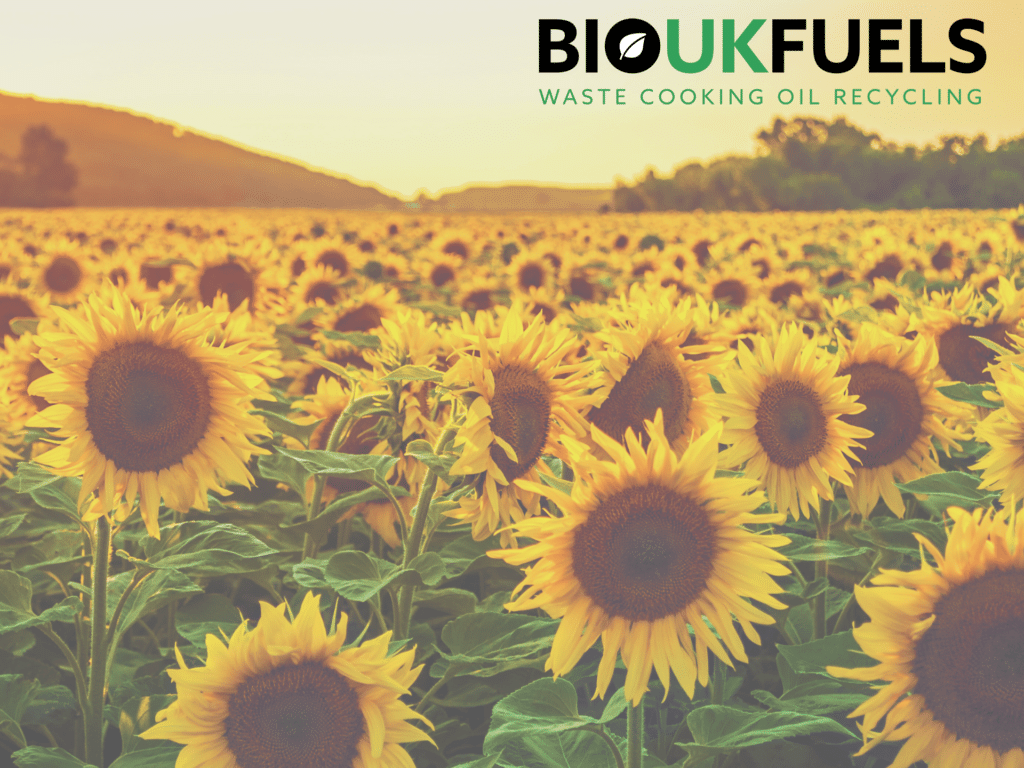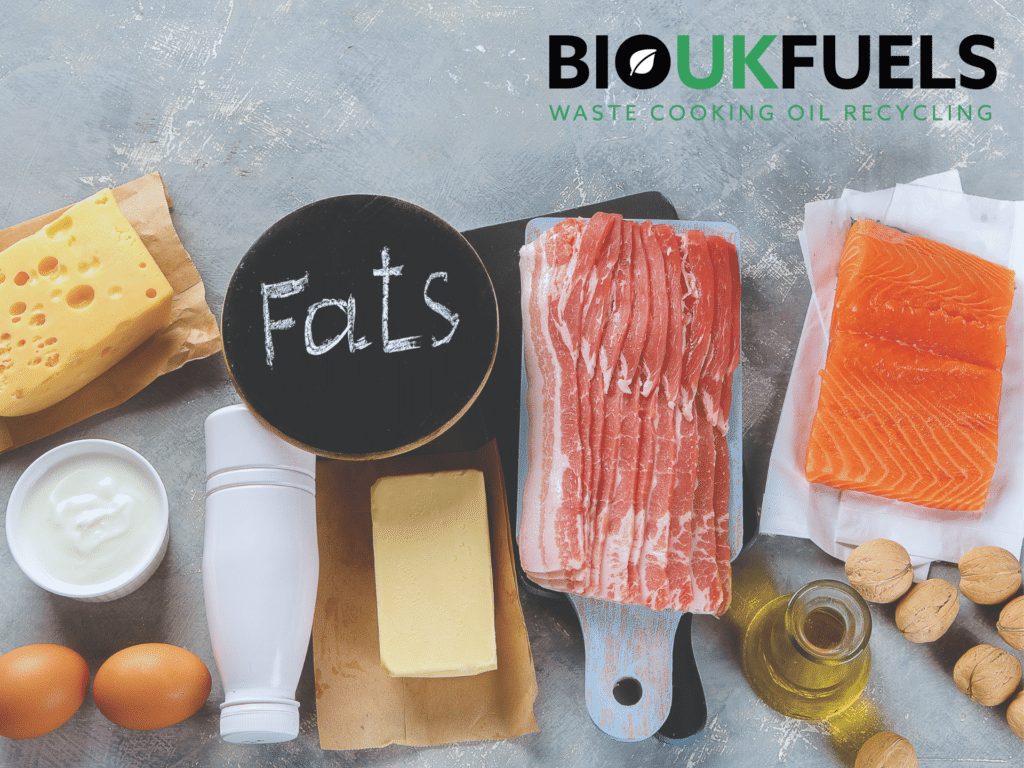Vegetable Oil vs Sunflower Oil: Which One is Better for Cooking?
At Bio UK Fuels, we’re focused on not only understanding cooking oils but also recycling them responsibly. We work with restaurants, businesses, and institutions across the UK, collecting and recycling waste cooking oil to reduce environmental impact and produce sustainable biofuels. If you’re in the food industry and want to dispose of used cooking oil responsibly, check out our waste cooking oil collection services to learn more about how we can assist.
For chefs, restaurants, and home cooks alike, the choice of cooking oil can make a big difference in flavour, cooking results, and health impact. Among the most common options are vegetable oil and sunflower oil, each with distinct properties that cater to different cooking needs. Whether you’re aiming for the high smoke point of sunflower oil or the cost-effectiveness of vegetable oil, understanding their characteristics is key. Additionally, considering the smoke points and suitability of other vegetable oils can help you choose the best oil for frying, baking, and other cooking methods.
Choosing the right cooking oil can be a daunting task, especially with the numerous options available in the market. Vegetable oil and sunflower oil are two popular choices, but what sets them apart? In this article, we will delve into the world of cooking oils, exploring the differences between vegetable oils and sunflower oil, their nutritional values, and which one is best suited for your needs. Whether you’re a home cook or a professional chef, understanding these oils’ unique properties will help you make the best choice for your culinary creations.
Nutrition and Health Benefits
What is Vegetable Oil?
Vegetable oil is generally a blend of various oils, including soybean oil, palm oil, and canola oil. It’s high in polyunsaturated fats, particularly omega-6 fatty acids, which are essential for bodily functions but can contribute to inflammation if consumed in excess. Since the specific nutritional profile of vegetable oil can vary depending on its source oils, it’s essential to check labels if you want details on its saturated fat and monounsaturated fat content. Read more on the health benefits of monounsaturated fats


What is Sunflower Oil?
Sunflower oil is derived solely from sunflower seeds and is known for its high vitamin E content, an antioxidant that supports immune function and skin health. High-oleic sunflower oil, a common variant, contains higher amounts of monounsaturated fats, which are associated with heart health. This makes sunflower oil a popular choice for those seeking a balanced fatty acid profile and a source of essential fatty acids without excessive saturated fat. Additionally, the low content of saturated fats in sunflower oil contributes to its heart health benefits by helping to maintain healthy cholesterol levels.


Which Cooking Oil Is Healthiest?
Fatty Acid Composition
Both sunflower oils and vegetable oils contain a mix of polyunsaturated fats and monounsaturated fats, though in different ratios. Sunflower oils generally have a higher percentage of monounsaturated fats, which are considered heart-healthy and are also found in olive oil and avocado oil. On the other hand, vegetable oils often contain more polyunsaturated fats, particularly omega-6, which can be beneficial in moderation. However, the omega-6 to omega-3 balance is critical, as excess omega-6 may contribute to inflammation.
Potential Health Effects
The health impacts of vegetable oil and sunflower oil come down to their fatty acid profiles and antioxidant properties. Sunflower oil is rich in vitamin E, which has been linked to protecting cells from oxidative stress. Vegetable oil, especially when it contains soybean or corn oil, is high in polyunsaturated fats that help lower cholesterol levels. However, because vegetable oils are often has a high ratio of omega-6 fatty acids, it’s essential to balance its intake with omega-3 sources like flaxseed oil or fish oil for optimal health.


Smoke Point and Cooking Performance
Understanding Smoke Point and Its Importance in Cooking
The smoke point is the temperature at which an oil starts to smoke and break down, releasing harmful compounds and affecting the taste of your food. For high-temperature cooking methods, such as deep frying or high-heat cooking, using an oil with a high smoke point is crucial to avoid burning and producing off-flavors. The smoke point varies based on the oil type and its refinement level.
Smoke Point Comparison: Vegetable Oils vs. Sunflower Oils
Vegetable oil is a versatile cooking oil with a smoke point generally around 200°C, depending on its blend. This makes it suitable for medium-high heat cooking like shallow frying and baking. Sunflower oil, on the other hand, has a higher smoke point—around 230°C (450°F)—making it more suitable for high-heat cooking such as grilling, frying, and deep frying. This high smoke point is especially beneficial when preparing dishes requiring sustained high temperatures without altering the oil’s flavor or stability.
Flavor Profile and Cooking Versatility
Both vegetable oil and sunflower oil have a relatively neutral taste, which enhances their versatility in cooking. Sunflower oil’s mild flavor profile makes it a great option for delicate dishes, salad dressings, and sauces where the oil should not overpower the other ingredients. Vegetable oil, depending on the blend, may have a slightly more varied flavor profile but generally remains mild, making it suitable for baking, frying, and sautéing.
Ideal Cooking Uses for Vegetable Oils
Vegetable oil is commonly used in baking, salad dressings, and other cooking methods that do not require extremely high temperatures. Its lower smoke point compared to some other oils makes it more suited for moderate-heat cooking. Additionally, because vegetable oils are often less expensive than sunflower or specialty oils, they are a cost-effective option for recipes requiring significant amounts of oil.
Ideal Cooking Uses for Sunflower Oil
With a high smoke point and neutral flavor, sunflower oil is ideal for high-temperature cooking methods, including frying, grilling, and stir-frying. The high oleic acid content in some sunflower oil varieties also makes it more stable under heat, which reduces the production of harmful compounds and helps retain the food’s flavor. It’s an excellent choice for high-heat cooking when you need an oil that won’t degrade at elevated temperatures.
Smoke Points and Health Considerations
When oils are heated past their smoke point, they can release harmful compounds and produce free radicals that negatively affect health. For this reason, choosing the right oil for specific cooking methods is essential. Sunflower oil’s high smoke point makes it less likely to degrade in high-heat applications, whereas vegetable oils are best used in cooking methods that keep temperatures below its smoke point.
Consideration of Other Oils
While vegetable oil and sunflower oil are both versatile, other oils like extra virgin olive oil, coconut oil, and avocado oil each offer unique characteristics in terms of flavor, smoke point, and nutritional profile. Olive oil is great for lower-heat cooking, avocado oil boasts a high smoke point, and coconut oil offers a distinct flavor that pairs well with specific dishes.
Environmental Impact and Sustainability
Environmental Considerations for Vegetable Oil Production
Vegetable oil production, particularly of oils like palm oil and soybean oil, has been associated with environmental concerns. Large-scale production of these oils can lead to deforestation, biodiversity loss, and greenhouse gas emissions. For instance, palm oil production has been linked to deforestation in tropical regions, threatening species and contributing to habitat destruction. Because vegetable oils often come from large plantations, their production can also involve intensive water use, pesticide application, and soil degradation, all of which pose sustainability challenges. Read more on environmental impact of palm oil production
Environmental Impact of Sunflower Oil
Sunflower oil production generally has a lower environmental impact than some other plant-based oils. Sunflowers require less water than other crops, and their growth does not typically result in deforestation, making sunflower oil a relatively sustainable choice. Additionally, sunflower plants are efficient in absorbing carbon dioxide, which helps reduce overall carbon levels. This makes sunflower oil a popular choice for environmentally conscious consumers who prioritise reducing their carbon footprint.
Sustainable Oil Options and Alternatives
While both sunflower oil and vegetable oils are common, consumers can consider other sustainable oils like rapeseed oil, which has a low environmental impact and is often grown locally in regions like the UK. Olive oil, specifically extra virgin olive oil, is another environmentally friendly option, particularly when grown organically or with sustainable farming practices. Avocado oil and coconut oil are also relatively sustainable, depending on their production methods. Check out our other blog article on rapeseed oil Vs olive oil.
Tips for Choosing Environmentally Friendly Oils
For those prioritizing sustainability, opting for organically produced oils, locally sourced oils, or oils certified by environmental standards (such as organic or fair-trade certifications) can make a difference. Additionally, using recycled oil containers and supporting brands Like Bio UK Fuels that promote eco-friendly practices can further reduce environmental impact.
Best Uses for Vegetable Oil
Vegetable oil is a versatile option, especially suited for baking, shallow frying, and creating salad dressings. Because of its generally neutral flavor and lower cost, it’s a staple in both home and commercial kitchens for moderate-heat applications. Since vegetable oil is often a blend, checking the label for specific contents can be helpful, especially if you need a certain type of oil, like Rapeseed Oil (Canola Oil) or soybean oil.
Best Uses for Sunflower Oil
With its high smoke point and light taste, sunflower oil is ideal for high-heat cooking, such as deep frying, grilling, and stir-frying. It is particularly useful for delicate dishes where the oil shouldn’t overpower the flavors. High-oleic sunflower oil, which contains higher monounsaturated fat content, can be a good choice for even more stability during high-temperature cooking.
Considerations for Health and Flavor Preferences
Choosing between vegetable oil and sunflower oil often depends on your health goals and flavor preferences. If you’re seeking an oil lower in polyunsaturated fats, sunflower oil with its high monounsaturated fat content may be preferable. Alternatively, for a balance of omega-3 and omega-6 fatty acids, a blend of vegetable oils that includes canola oil or flaxseed oil might be beneficial.
Choosing the Right Oil for Your Needs
When it comes to selecting a cooking oil, there are several factors to consider. The type of cooking you will be doing, the flavor you want to achieve, and the nutritional value of the oil are all important considerations. Vegetable oil and sunflower oil have different characteristics that make them suitable for different uses.
Vegetable Oil VsSunflower Oil FAQs
What’s the Difference Between Sunflower Oil and Vegetable Oil?
Sunflower oil is extracted solely from sunflower seeds and is often high in vitamin E and monounsaturated fats. Vegetable oil is typically a blend of various plant-based oils and can vary in nutritional content.
Is Sunflower Oil Healthier Than Vegetable Oil?
Sunflower oil is often richer in vitamin E and monounsaturated fats, making it a popular choice for heart health. However, vegetable oil provides essential polyunsaturated fats and may offer a wider range of nutrients if it’s a balanced blend.
Can I Use Sunflower Oil Instead of Vegetable Oil?
Yes, both oils have a neutral flavor, making them interchangeable in many recipes. However, sunflower oil’s higher smoke point makes it a better option for high-heat cooking.
Which Oil Is Better For Frying: Sunflower Oil Or Vegetable Oil?
Sunflower oil, due to its higher smoke point, is generally better for frying. It remains stable at higher temperatures compared to most vegetable oils, reducing the risk of producing harmful compounds.
Choosing between vegetable oil and sunflower oil depends on your cooking style, health preferences, and environmental priorities. Sunflower oil may be better for high-heat cooking and offers benefits like a higher monounsaturated fat content. Vegetable oil is versatile and economical, suitable for medium-heat cooking and baking. By understanding these differences, you can make the best choice for your culinary needs.
About Martin Simpkins
Martin Simpkins is a dedicated business professional with hands-on experience in operations, fuel supply management, and client service within the UK energy sector. Through his role at Bio UK Fuels, he has been involved in daily business operations, customer coordination, and ensuring smooth delivery of fuel services to commercial clients.
Martin’s work reflects strong organisational skills, a practical approach to problem-solving, and a focus on maintaining reliable business relationships. Colleagues and partners know him for his steady communication style and his commitment to keeping projects running efficiently.


